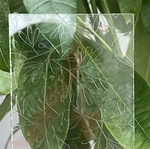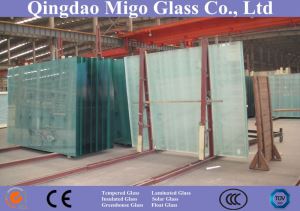As a glass sheet supplier, I understand the importance of scratch resistance in glass products. Scratches not only affect the aesthetic appeal of glass sheets but also compromise their structural integrity and functionality. In this blog post, I will share some effective methods to make a glass sheet more scratch-resistant, which can be valuable for both manufacturers and end-users.
Understanding the Basics of Glass Scratching
Before delving into the solutions, it's essential to understand how glass gets scratched. Glass is a brittle material composed of a network of silicon dioxide molecules. When a hard object with a sharp edge comes into contact with the glass surface and applies sufficient pressure, it can break the chemical bonds within the glass network, resulting in a scratch. The susceptibility of glass to scratching depends on several factors, including its composition, surface hardness, and the nature of the contacting material.


1. Surface Treatments
Chemical Strengthening
One of the most common methods to enhance the scratch resistance of glass is chemical strengthening. This process involves immersing the glass sheet in a molten salt bath containing potassium ions at a specific temperature. The smaller sodium ions in the glass surface are exchanged with the larger potassium ions from the salt bath. This ion exchange creates a compressive stress layer on the glass surface, which makes it more resistant to scratches and impacts. Chemical strengthening can significantly improve the scratch resistance of glass, especially for thin glass sheets used in mobile devices and touchscreens.
Coating Applications
Applying a protective coating to the glass surface is another effective way to increase scratch resistance. There are various types of coatings available, each with its own unique properties and benefits.
- Hard Coatings: Hard coatings, such as silicon dioxide-based coatings, can significantly increase the surface hardness of the glass. These coatings are typically applied using techniques like physical vapor deposition (PVD) or chemical vapor deposition (CVD). Hard coatings form a thin, durable layer on the glass surface that acts as a barrier against scratches.
- Anti-Scratch Films: Anti-scratch films are adhesive films that can be applied to the glass surface. These films are made of materials like polyethylene terephthalate (PET) or polycarbonate and are designed to absorb the impact of scratches, protecting the underlying glass. Anti-scratch films are easy to apply and can be removed without leaving any residue, making them a popular choice for protecting glass surfaces in various applications.
2. Material Selection
High-Quality Glass
Choosing high-quality glass is the first step in ensuring scratch resistance. Different types of glass have different levels of scratch resistance. For example, borosilicate glass is known for its high thermal resistance and relatively good scratch resistance compared to soda-lime glass. When selecting glass for your application, consider the specific requirements and choose a glass type that offers the best balance of properties, including scratch resistance.
Thicker Glass
In general, thicker glass sheets are more scratch-resistant than thinner ones. Thicker glass has a greater mass and a stronger structure, which can better withstand the forces that cause scratching. When possible, opt for thicker glass sheets to improve scratch resistance. However, it's important to note that thicker glass may also be heavier and more expensive, so a balance needs to be struck between scratch resistance and other factors such as cost and weight.
3. Handling and Maintenance
Proper Handling
Proper handling of glass sheets during transportation, installation, and use is crucial to prevent scratches. When handling glass, always wear gloves to avoid leaving fingerprints or scratches on the surface. Use soft, clean cloths or padding to protect the glass during transportation and storage. Avoid placing sharp or abrasive objects on the glass surface, and be careful not to drag or slide objects across the glass.
Regular Cleaning
Regular cleaning of glass sheets can help maintain their scratch resistance. Use a mild, non-abrasive cleaner and a soft cloth or sponge to clean the glass surface. Avoid using harsh chemicals or abrasive cleaners, as these can damage the glass surface and reduce its scratch resistance. After cleaning, dry the glass thoroughly with a clean, soft cloth to prevent water spots and streaks.
4. Design Considerations
Edge Finishing
The edges of glass sheets can be a source of scratches, especially if they are not properly finished. Sharp edges can easily catch on objects and cause scratches, while rough edges can also damage the glass surface. To prevent this, ensure that the edges of the glass sheets are properly finished. Edge finishing techniques such as grinding, polishing, or beveling can smooth the edges and reduce the risk of scratching.
Protective Frames and Edging
Using protective frames and edging around the glass sheets can also help prevent scratches. Frames and edging can provide a buffer between the glass and other objects, reducing the risk of direct contact and scratching. Choose frames and edging materials that are soft and non-abrasive to avoid scratching the glass surface.
Our Glass Sheet Products
At our company, we offer a wide range of high-quality glass sheets with excellent scratch resistance. Our 2mm to 19mm Clear and Tinted Float Glass is available in various thicknesses and colors, making it suitable for a variety of applications. We also provide Clear Float Glass 3mm -19mm and 4mm to 8mm Tinted Float Glass, which are known for their clarity, durability, and scratch resistance.
If you are interested in our glass sheet products or have any questions about scratch resistance, please feel free to contact us. We are always happy to help you find the best glass solution for your needs.
References
- Ashby, M. F., & Jones, D. R. H. (2005). Engineering Materials 1: An Introduction to Properties, Applications, and Design. Butterworth-Heinemann.
- Schott, D. (2013). Glass for Display Applications. Wiley-VCH.
- Wondraczek, L., & Beall, G. H. (2012). Handbook of Glass Properties. Springer.

